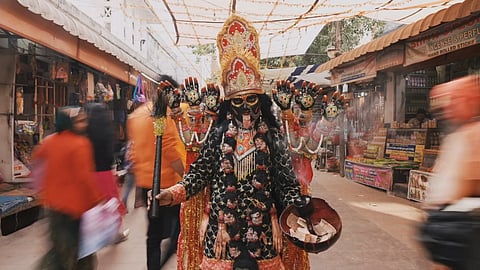
- HOMEGROWN WORLD
- #HGCREATORS
- #HGEXPLORE
- #HGVOICES
- #HGSHOP
- CAREERS
- ABOUT US
- CONTACT US

Theologian and philosopher Saint Augustine said, “God has no need of your money, but the poor have. You give it to the poor and God receives it.” This should make sense to most of us, yet we still see countless devotees who do not think twice before donating to temples, but when a beggar extends a palm right outside, they search for the smallest amount of change possible. Discrepancies and contradictions like these that permeate our values and beliefs is where Sonali Rajkumar Devnani’s documentary 'The Divine Hustle' situates itself.
The film, which will have its world premiere at the Chicago South Asian Film Festival on September 21, 2025, follows three figures who mete out divinity as a means of survival: Khushi, Gopal, and Abhishek. The film has been produced by Mahesh Vasnani, filmed by Gaurav Bhalerao and Satish Khare, edited by Gasper D’Souza, and set to music by Neeraj Chouhan and Sanjay Sharma. Shot across Varanasi, Mathura, Pushkar and Vrindavan and opening against the vast choreography of the Kumbh Mela, the documentary establishes through itself, a visual and moral inquiry rather than a polemic.
Sonali's camera luxuriates in religious mise-en-scène: the saffron, the incense, the riverside practiced gestures, while never losing sight of the transactions that animate those images. Here, people dress up as a deities, offering blessings, applying tilak as a means of earning a day’s bread. Through vignettes from the lives of these subjects and a series of interviews, the documentary examines the commodification of religion and devotion.
Gopal, born with a disability, is coerced to dress up and beg by a father whose violence and vices turn the child’s body into a source of income for his own greed. Khushi who dresses up as Shiva is saving up for her mother's operation and is sustaining her family with her practice. And so is Abhishek, a young father who dresses as Kali. The film captures the mixed responses such performances get: some donate willingly out of generosity, others are more sceptical of this livelihood, which they believe is an exploitation of their faith.
And priests are the most vocal opponents of this argument. They call it a bastardisation of their religion and that it's immoral and disrespectful to see ordinary people dressing up as gods and asking for money. But these voices also come from men who sit at the top of the caste order. As Brahmins, they have inherited both power and profit from religion for generations. They run their own businesses of faith, performing pujas that cost lakhs, setting their own prices, and benefitting from a system built in their favour. The only difference is that the caste system legitimises their earnings while condemning others who try to survive through the same symbols of belief.
Against this scrutiny, Abhishek finds himself pondering the same. He asks why priests, who grow wealthy from endless donations, live like kings and are never questioned, while the poor who dress as gods to earn a few hundred rupees are treated as frauds. His argument cuts to the hypocrisy at the heart of this economy of faith — the difference is not in the act of receiving money in the name of god, but in who is allowed to do it.
Instead of a critique of religion itself, The Divine Hustle presents devotion in a dialogue with structural inequality. It sheds light on the social fault lines of class, caste, marginalisation, and hierarchies of power, through a compelling portrait of the informal economies of faith while critiquing the uneven access to it.
Follow Sonali here and watch the trailer below.
If you enjoyed reading this here's more from Homegrown:
Neel Soni's Documentary Is A Story Of Trans Resilience In The Forests Of Uttarakhand
Paromita Vohra's Thoughtful 2002 Documentary Asks What It Means To Be An Indian Feminist
A Homegrown Documentary Captures The Loss Of Koli Community's Connection With The Sea
